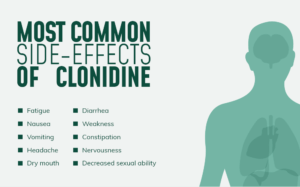Contents
What Is Clonidine (Kapvay and Catapres)?
 Clonidine (Kapvay and Catapres) is a medication that is used to treat both high blood pressure and the anxiety disorder that accompanies it. It can be used to help calm people during work or medical procedures, such as when taking an MRI. Clonidine also reduces physical symptoms of high blood pressure like dizziness, headaches. It may be given during a short procedure, such as a colonoscopy. It is not meant to take over the course of a longer treatment for hypertension.
Clonidine (Kapvay and Catapres) is a medication that is used to treat both high blood pressure and the anxiety disorder that accompanies it. It can be used to help calm people during work or medical procedures, such as when taking an MRI. Clonidine also reduces physical symptoms of high blood pressure like dizziness, headaches. It may be given during a short procedure, such as a colonoscopy. It is not meant to take over the course of a longer treatment for hypertension.
Clonidine (Kapvay and Catapres) is also used to treat attention-deficit hyperactivity disorder (ADHD). It can help people who are having trouble paying attention, controlling their activity level, or following directions. It may also be used for purposes not listed in this medication guide.
Clonidine is used for conditions like obsessive-compulsive disorder, Tourette syndrome, and panic disorder. Clonidine is a medication that is often prescribed for people who have trouble sleeping or feel anxious. It helps to prevent severe spikes in blood pressure that can happen while these patients are getting ready for bed or when they wake up in the morning.
Direction Of Use

Clonidine (Kapvay and Catapres) comes as a tablet or a patch that you place on your skin. You will likely start with a low dose of clonidine and increase it slowly over several weeks. Follow your doctor’s instructions about how to take clonidine (Kapvay and Catapres).
- Clonidine (Kapvay and Catapres) is usually taken twice a day, with the first dose in the morning and the second dose at bedtime.
- Clonidine may also be taken three times a day if needed.
- If you are using the tablet form of clonidine (Kapvay and Catapres), you can take it with or without food.
- Take clonidine (Kapvay and Catapres) at the same time each day to avoid missing a dose.
If you are using the extended-release tablet, follow the package instructions to place it in your mouth properly. Do not swallow the tablet whole. Allow it to dissolve in your mouth without chewing. Swallow several times as the tablet dissolves. If you are using clonidine (Kapvay and Catapres) before a surgery, stop taking it at least 2 weeks ahead of time.
Dosages Of Clonidine
The patient can take Clonidine (Kapvay and Catapres) twice a day, with the first dose in the morning and the second dose at bedtime. It is ok to use clonidine three times a day if needed. Because Clonidine (Kapvay and Catapres) may be habit-forming. Do not take a larger dose, take it more often, or take it for a longer period of time than your doctor tells you to. If this medicine is stopped suddenly, you may experience withdrawal symptoms such as restlessness, irritability, trouble sleeping, increased blood pressure, a fast heartbeat, and sweating.
Things To Know About Clonidine (Kapvay and Catapres)

The FDA has issued a safety warning about clonidine (Kapvay and Catapres). Recent studies have shown a possible connection between prescription medicines like clonidine and serious, possibly fatal side effects on the heart. These problems can happen within hours to weeks after starting Kapvay and Catapres. The risk is higher for people who already have certain types of heart problems or heart defects.
If you are taking both clonidine (Kapvay and Catapres) and another ADHD medication, talk with your doctor about the effects it may have on your heart.
Side Effects Of Clonidine
Some people get these symptoms when they begin taking clonidine (Kapvay and Catapres):

- Confusion
- Lightheadedness, especially when standing quickly from a sitting or lying position
- Drowsiness or tired feeling
- Slow heart rate
- Low blood pressure (this may cause dizziness when you change positions)
- Drooping eyelids
- Nausea, vomiting, dry mouth, stomach pain
- Decreased sex drive or impotence
If these symptoms are mild, they may go away within a few days. Your doctor may also prescribe other medicines to help relieve some of these symptoms. If you notice other effects that you think might be from clonidine (Kapvay and Catapres), talk to your doctor.
Some side effects may be more likely in older adults. Taking certain other medicines along with clonidine can also increase the risk of some of these side effects. Talk with your doctor before using this medicine if you have any concerns. Also, for those who take clonidine as a blood pressure medication: low blood pressure (hypotension), slow heart rate (bradycardia), fainting, heart attack, stroke, and heart failure.
Who Shouldn’t Use Clonidine (Kapvay and Catapres)?

Do not use clonidine (Kapvay and Catapres) if you are allergic to it. Or if you have an untreated bleeding disorder such as hemophilia. Clonidine can make it harder for your blood to clot. If you have any of these conditions, talk with your doctor about other medications. That might be less likely to cause this problem.
Do not use clonidine if you are pregnant or breastfeeding unless your doctor has told you to.
Older adults may be more likely to have side effects from clonidine (Kapvay and Catapres). This medication can also affect blood flow in older adults, which could make some side effects worse. People 65 years of age or older should not take this medication without talking with their healthcare provider first.
Kapvay and Catapres are not approved for use by anyone younger than 6 years old or weighing less than 88 pounds (40 kilograms).
Why Is This Important For A Patient With Hypertension?
Clonidine is an important medication for people with high blood pressure or hypertension. It can help to lower blood pressure and keep it under control. It is important to take clonidine as prescribed by your doctor. And to tell them if you have any side effects. If you have any questions about your blood pressure or clonidine, contact your doctor.
Clonidine (Kapvay and Catapres) can increase the risk of suicidal thoughts or actions, especially if the person has a history of depression or mental illness. Seek emergency medical attention if you have any new or worsening symptoms of depression, unusual changes in mood or behavior, or thoughts about hurting yourself.
Conclusion
Clonidine is a medication that has been used for over 40 years to treat hypertension and other medical conditions. It’s an alpha-2 receptor agonist, which means it stimulates the part of your brain responsible for producing chemicals called neurotransmitters. Clonidine also helps decrease how much adrenaline releases into your system. Usually by blocking a chemical pathway in the body known as PKA. This makes sense why clonidine helps control ADHD symptoms. Such as lowering feelings of anxiety or depression, improving sleep quality, and more.
If you are looking for affordable Online Counseling MantraCare can help: Book a trial therapy session


